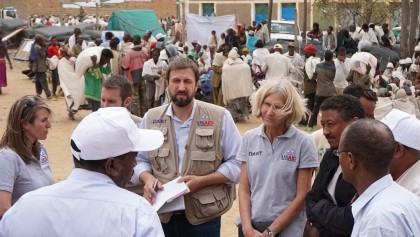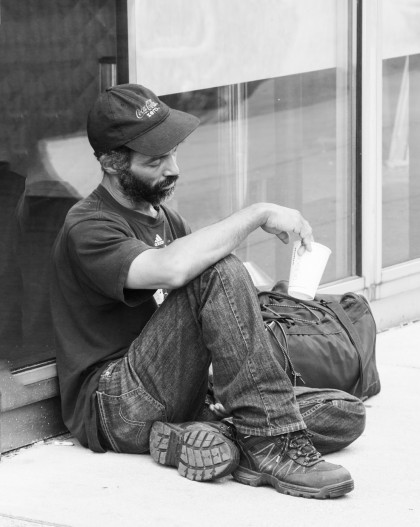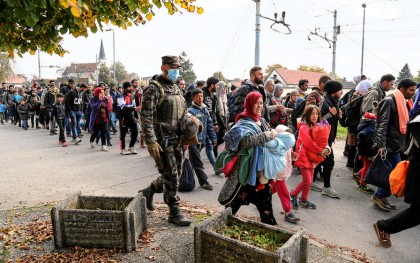Catholic Relief Services, Cash for the Homeless, and the Needs of Migrants: Unmasking False Dilemmas
Devra Torres | Nov 23, 2016 | 3 cmts

A recent dustup in my little corner of cyberspace concerns whether Catholic Relief Services is complicit in distributing contraception and abortifacients to the people they're supposed to be helping. The Lepanto Institute has cast doubt on their Catholic credentials, and they've responded, in a way that sounds convincing to me. Lots of lives hang in the balance. I don't claim to know for sure who's right. But the question is: Should I donate to them, or not?
Or is it?
Here's another one: Should I give money to the homeless guy at the freeway entrance, knowing that he might spend it on the drugs or alcohol that have contributed to his present misery? Or is it kinder to drive on by? That is the question.
Or is it?
Finally, the world is full of migrants in desperate circumstances, but by opening our borders to them we risk putting our country in danger. Given the danger to law-abiding citizens, do we let them in, or do we keep them out? That's what we need to ask ourselves.
Or is it?
Donate to this charity, or not? Help this homeless man, or not? Open our doors to migrants, or not?
But it's a trap. There's something fatally wrong with the question, which in each case comes down to: Should I do this particular work of charity, or should I do no work of charity at all?

And if I decide on no work of charity at all precisely because my conscience won't allow it--isn't that even worse than neglecting the needy out of sheer sloth and self-centeredness? Not only am I doing nothing, I'm appealing to my own moral purity, weighing myself down with self-righteous pride on top of who knows how many sins of omission. I'd like to help, but what can I do? My conscience won't let me!
Well and good, but then what are we supposed to do? Naively finance abortion, addiction, and terrorism, out of ignorance, or willful blindness?
No, of course not! Please keep reading!
Here's what my pastor used to do when he was supposed to take up a collection for a charity which he (after serious research) had his doubts about. He would announce the collection (he wasn't a bishop, and he had no authority to simply cancel it), explain his doubts, and then set up means for people to contribute to it or to other, specific good causes that there were no doubts about.
Here's what my friend Clare did when she was pondering the question of how to help the homeless. She decided she wanted neither to give cash nor to do nothing, so she arranged for a bunch of local families to get together and create kits for the homeless: food, shaving cream, warm socks, and so on. Again, this was after diligent research into what would actually help.
And then there's the refugee question. Well, you and I have no power to singlehandedly shape the nation's immigration policy. But we can be honest about admitting there are two sides to the question, and we can look for ways to help immigrants that don't even remotely involve aiding and abetting terrorism. My friend organized a coat drive for Syrian refugee children. My brother is looking into getting certified as a medical interpreter. And on an institutional level, too, there are plenty of charities that help refugees with immediate needs and aren't trying to influence foreign policy one way or the other. Your conscience can't possibly object.

As Pope Emeritus Benedict puts it in his encyclical on hope, the point is to go from the "informative" to the "performative"--to get beyond gathering information and on to acting on the truth.
Again and again and again, it comes down to: What's the good that's in my hands to do?
"You're doing it wrong" may be perfectly true, but it's never supposed to be the end of the story.

Comments (3)
Peter
Dec 2, 2016 10:54am
I'm reminded of Johannes De Silentio's dialectical lyric, "Fear and Trembling", which also has relevant implications for the post election state of our country. So, related to this post and to the post election state, the lyric explores the relevance of faith (two different kinds in the knight of faith and in the knight of infinite resignation) to a personalist perspective in the knight of faith, in which the personalist's immanent experience is regained and therefore validated. In "The Journals", Kierkegaard writes, "Therefore faith hopes also in this life, but… by virtue of the absurd, not by virtue of the human understanding." and, "The paradox of Christian truth is invariably due to the fact that it is truth as it exists for God. The standard of measure and the end is superhuman; and there is only one relationship possible: faith." In "Fear and Trembling", it is just this teleological suspension of the ethical that may be an advantageous perspective for the personalist to take in our country's post election state, of course, as the knight of faith, and may be "the only possible relationship" for the personalist. In any case, we stand to regain our immanent selves in this faith.
Peter
Dec 2, 2016 11:19am
As it specifically relates to this post, I think it is congruent with what "the good that's in my hands to do". When our immanent experience is intact, we intuitively know what to do, even if we are existing in the double world of the teleological suspension of the ethical. In my own experience, again and again I find that the more I am in touch with this personal self, this immanent experience, this particular experience, the more likely my intuition is able to harmonize with the divine will from which I learn and grow into a better person. Reclaiming and regaining this personal self seems to be my new path and this has been known by the name of "soul growth". I think this may be what faith is for the personalist: faith in my immanent experience with an open mind and heart to God's Love and Truth for guidance, transformation, healing, growth and inner and outer peace for my life and others. What is God saying to you? How is God speaking to you? What is true about your immanent experience? Where can I grow? What needs healing? Am I creating peace within and without?
Alice
Dec 6, 2016 1:14am
I think if we give freely, we give trust. I personally think there is a gift in that- to restore freedom. I'm not saying that naively- just as an idea that says you value the others freedom in choosing- even if they make the wrong choices.